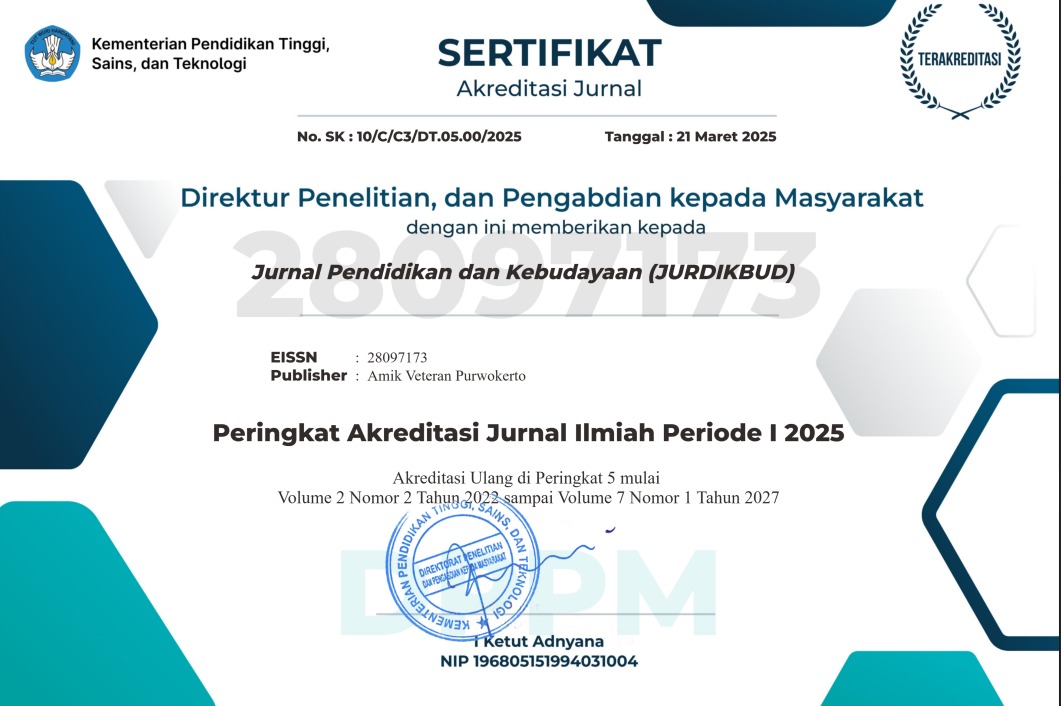Juvenile Delinquency yang Menyebabkan Menurunnya Attitude Siswa SMK S Pembangunan Bukittinggi
DOI:
https://doi.org/10.55606/jurdikbud.v4i1.2793Keywords:
Juvenile delinquency, Attitude, StudentAbstract
In today's Alpha era, teenagers have forgotten their role as the next generation of the nation and the State of Indonesia. Adolescence is a transition period from child to adult. This time is the cause of Indonesian juvenile delinquency greatly increased. The purpose of this study is to examine Juvevile Delinquency or juvenile delinquency that causes a decrease in adolescent Etitude. One of the attitudes that adolescents must have is knowledge of ethical values passed down by ancestors. Social changes and value shifts have affected the development of adolescents, causing the old culture to be left behind due to the emergence of a new culture in the Alpha era. Bulliying is everywhere, physical violence against the community is carried out by teenagers, speaking inappropriately to both older and younger, turning their backs on kato nan ampek, bullying and so on. One of the consequences of social change that causes juvenile delinquency to increase is the shift, the fall of adolescents into deviant behavior that is not in accordance with normal values and social rules. Conditions like this do not rule out the possibility of pervasive genegration with the designation Juvevile Delinquency lowering the Etitude of children in the community. One of the factors of juvenile delinquency that causes Etitude to decline when the way of communication practiced by the gods does not reflect good communication, speaking loudly and using harsh and harsh language and is considered correct by some adolescents, weakening moral degradation and reduced family functions and the role of the family, and society in fostering adolescents. When the functions of these related parties are weakened, there will be defects in the actions of adolescents. The method in this research is a literature study (study research), which collects various sources and information that can examine juvenile delinquency that causes a decrease in adolescent ethics. The expected result in this research is to create teenagers who have good ethics in communication which is expected in a positive social environment and in accordance with applicable norms. Hopefully this can provide positive teaching for all of us.
References
Ali, Sudarmo, Mudjijono, Hermawan, Hisbaron, & Noor Sulistyo. 1996. Fungsi Keluarga Dalam Mening- katkan Sumber Daya Manusia. Yogyakarta: Departemen Pendidikan dan Kebudayaan.
Asrori, Mohammad & Mohammad Ali. 2012. Psikologi Remaja: Perkem- bangan Peserta Didik. Jakarta: Bumi Aksara.
Bambang, S, Murdianto, & Utomo, Bambang. Modul Mata Kuliah Sosiologi Pedesaan. Bogor: Jurusan Sosial Ekonomi Pertanian, Fakultas Pertanian IPB.
Mufidah, 2013. Psikologi Keluarga Islam Berwawasan Gender, Malang: Maliki Press.
Pujosuwarno, Sayeki, 1994. Bimbingan
Puspitawati, Herien. Konsep dan Teori Keluarga (pdf ikk.fema.ipb.ac.id) diunduh pada 25 Februari 2019.
Sarwono, Sarlito Wirawan. 2008. Psikologi Remaja. Jakarta: Raja Grafindo.
Soemantri, Endang. 1993. Pendidikan Moral. Bandung: Diktat FP IPS IKIP.
Walgito, Bimo. 2004. Bimbingan dan Konseling Pernikahan. Yogyakarta: Andi.
Downloads
Published
How to Cite
Issue
Section
License
Copyright (c) 2024 Jurnal Pendidikan dan Kebudayaan (JURDIKBUD)

This work is licensed under a Creative Commons Attribution-ShareAlike 4.0 International License.









